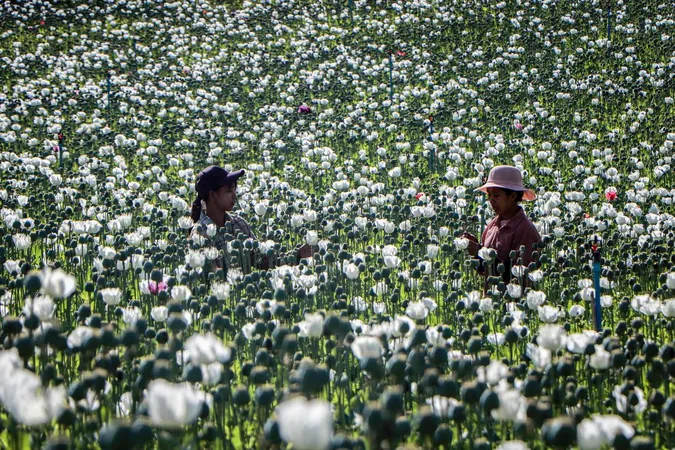
Myanmar’s Descent into Chaos: A New Criminal Empire
2025-01-01
Author: Daniel
Myanmar’s Descent into Chaos: A New Criminal Empire
In the lush hills of Shan State, Myanmar, fields of opium poppy stretch along the roads, a stark contrast to the brutal civil war unfolding within the country. While the colorful blooms paint a seemingly picturesque landscape, they signify Myanmar's alarming status as the world's largest exporter of opium, the primary ingredient in heroin. This is only the tip of the iceberg.
Since the military coup in February 2021 that ousted the democratically elected government, Myanmar has plunged into turmoil. This conflict has enabled the country to become a hotbed for various forms of transnational crime, with warlords, arms dealers, human traffickers, and drug syndicates capitalizing on the chaos. According to the Global Organised Crime Index, Myanmar has established itself as a central hub of organized crime.
The impact of this criminal activity devastates Myanmar's approximately 55 million citizens, while simultaneously exporting suffering and corruption across the globe. Reports suggest that Myanmar has become a significant player in both the opium and synthetic drug markets, producing astonishing quantities of methamphetamine, ketamine, and fentanyl. The ingredients for these drugs are smuggled in from neighboring China and India, feeding insatiable global demand, with prices hitting rock bottom due to the influx of supply.
Beyond narcotics, Myanmar possesses immense resources. It is notable for being the world’s largest exporter of certain rare earth elements critical for clean energy technologies. These commodities are extracted from illegal mines, often by impoverished workers driven to addiction, creating a cycle of exploitation.
Criminal networks in Myanmar, especially in border regions, have deep links with Chinese syndicates, who operate unchallenged, despite sporadic law enforcement actions from the Chinese government. These outfits not only supply arms to the military junta but also engage in the grim business of human trafficking, forcing kidnapped individuals to conduct online scams.
These scams have defrauded billions of dollars from individuals worldwide, with victims ranging from vulnerable retirees to unsuspecting romantics. "Organised crime thrives on conflict," cautioned Masood Karimipour of the UN Office on Drugs and Crime, emphasizing the troubling relationship between ongoing violence and organized crime profits.
Deep in Myanmar’s Shan Hills, opium farming has transformed from clandestine operations to open cultivation. Once hidden from authorities, fields of poppy now bloom openly in places such as Pekon township, revealing the lack of effective governance and the increasingly brazen nature of the drug trade.
With cheap drugs flooding the streets and jungle labs operating day and night, the situation grows increasingly dire. In 2023 alone, reports show that authorities in East and Southeast Asia seized a record 190 tonnes of methamphetamine, yet the drug's street value continues to plummet.
Meanwhile, areas along Myanmar’s border with Thailand have morphed into scam factories. Workers regularly engage in emotional manipulation and financial deception in a bid to apparate wealth from foolishly trusting strangers. One scammer recounted how he scammed retirees out of tens of thousands of euros, revealing the depth of desperation and moral conflict that pervades the regions.
Moreover, Myanmar’s mining landscape has changed dramatically in the wake of the coup. Rare earth elements critical for technologies like electric vehicles and renewable energy sources have soared in demand, leading to an intensified rush for minerals. With environmental regulations tossed aside and influence wielded by local militias and foreign corporations, these precious resources are extracted at alarming rates, often causing significant ecological destruction.
As rebel alliances rise against the military, control over mining operations remains contested, and smuggling routes continue to flourish. The opulence of Myanmar’s natural resources stands in stark contrast to the suffering of its people, fueling a cycle of addiction, conflict, and corruption that casts a long shadow over both the nation and the international community.
The implications of Myanmar’s current crises reach far beyond its borders, establishing it as a crucial player in the underground economy, and threatening stability not only regionally but across the globe. The spider web of organized crime feeds off the chaos, ensuring that the struggle for power and profits in Myanmar is far from over.
 Brasil (PT)
Brasil (PT)
 Canada (EN)
Canada (EN)
 Chile (ES)
Chile (ES)
 Česko (CS)
Česko (CS)
 대한민국 (KO)
대한민국 (KO)
 España (ES)
España (ES)
 France (FR)
France (FR)
 Hong Kong (EN)
Hong Kong (EN)
 Italia (IT)
Italia (IT)
 日本 (JA)
日本 (JA)
 Magyarország (HU)
Magyarország (HU)
 Norge (NO)
Norge (NO)
 Polska (PL)
Polska (PL)
 Schweiz (DE)
Schweiz (DE)
 Singapore (EN)
Singapore (EN)
 Sverige (SV)
Sverige (SV)
 Suomi (FI)
Suomi (FI)
 Türkiye (TR)
Türkiye (TR)
 الإمارات العربية المتحدة (AR)
الإمارات العربية المتحدة (AR)